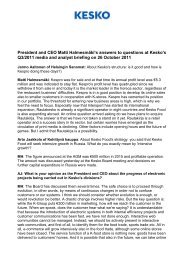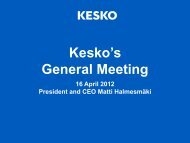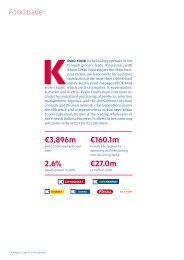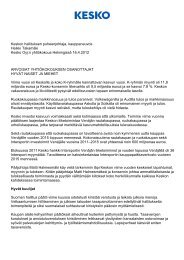Pdf version (3.2 MB) - Kesko
Pdf version (3.2 MB) - Kesko
Pdf version (3.2 MB) - Kesko
Create successful ePaper yourself
Turn your PDF publications into a flip-book with our unique Google optimized e-Paper software.
REspONsIbIlITy IN day-TO-day aCTIVITIEs<br />
stakeholders ranging from non-governmental<br />
organisations to suppliers of goods. A<br />
total of about 60 people participated in the<br />
discussions, bringing up suggestions of<br />
issues to be included in the future responsibility<br />
programme: customer inclusion,<br />
carbon footprint labels on products, training<br />
of sales assistants and increasing the<br />
responsibility information made available<br />
to customers in stores.<br />
In late 2011, <strong>Kesko</strong>'s Legal Affairs, Risk<br />
Management and Internal Audit organised<br />
a series of value discussions on <strong>Kesko</strong>'s<br />
responsible working principles for the divisions'<br />
managements and other key people in<br />
Finland. The special theme was combating<br />
bribery. In the previous year, value discussions<br />
were arranged in Sweden, Norway,<br />
Estonia, Latvia, Lithuania, Russia and Belarus.<br />
Read more on page 14.<br />
<strong>Kesko</strong> is active in many national and<br />
international organisations and seeks to<br />
impact the developments in its business<br />
sector. The most significant channels of<br />
influence can be read at www.kesko.fi/<br />
responsibility.<br />
<strong>Kesko</strong> has prepared a process description<br />
of stakeholder cooperation (see page 53) to<br />
facilitate the analysis and planning of the<br />
cooperation. Stakeholders’ expectations of<br />
<strong>Kesko</strong>, <strong>Kesko</strong>’s actions to meet these expectations,<br />
and indicators measuring the performance<br />
are described in the stakeholder<br />
group analysis of the Group’s responsibility<br />
work available at www.kesko.fi/<br />
responsibility. The divisions also use their<br />
specific stakeholder analyses.<br />
GENERAL OPERATING PRINCIPLES<br />
GUIDING RESPONSIBILITy<br />
<strong>Kesko</strong>’s Corporate Management Board has<br />
approved the Group’s general corporate<br />
responsibility principles. These principles<br />
define the basic economic, social and environmental<br />
responsibility promises, and<br />
related communication principles. <strong>Kesko</strong>’s<br />
commitments to international declarations<br />
and conventions are also included<br />
in the principles. The most important of<br />
them are the UN Universal Declaration of<br />
Human Rights and the UN Convention of<br />
the Rights of the Child, the ILO convention<br />
on the Fundamental Rights and Principles<br />
at Work, the OECD Guidelines for Multinational<br />
Corporations, the ICC Business<br />
Charter for Sustainable Development and<br />
principles against corruption and bribery,<br />
the UN Global Compact initiative, and the<br />
purchasing principles of the Business Social<br />
Compliance Initiative (BSCI). <strong>Kesko</strong> has used<br />
the ISO 26000 standard as a source document<br />
that offers orientation to corporate<br />
responsibility. The Board of the K-Retailers’<br />
Association has recommended that <strong>Kesko</strong>’s<br />
principles be also followed by K-stores.<br />
54<br />
<strong>Kesko</strong> Corporate Responsibility Report 2011<br />
<strong>Kesko</strong>’s corporate responsibility principles<br />
can be read at www.kesko.fi/responsibility.<br />
<strong>Kesko</strong>’s general corporate responsibility<br />
principles are complemented by<br />
more detailed policies, principles, stands<br />
and statements. They are listed in the guide<br />
'Our Responsible Working Principles' and at<br />
www.kesko.fi/responsibility.<br />
<strong>Kesko</strong> reports on economic, environmental<br />
and social responsibility in compliance<br />
with the GRI guidelines <strong>version</strong> 3.0.<br />
RESPONSIBILITy STEERING<br />
Economic responsibility<br />
At <strong>Kesko</strong>, economic responsibility refers<br />
to the good management of finances, the<br />
efficient use of resources, as well as generating<br />
stable, long-term economic benefits<br />
to different stakeholders. Financial results<br />
must be achieved in responsible ways – supported<br />
by good corporate governance, open<br />
communications and effective stakeholder<br />
interaction, while taking environmental and<br />
social responsibility into account.<br />
General management of economic<br />
responsibility is complemented by corporate<br />
governance principles, risk management<br />
and internal audit principles, <strong>Kesko</strong>’s<br />
ethical purchasing principles, as well as<br />
other practices and guidelines for product<br />
and service purchases.<br />
Environmental responsibility<br />
Environmental management is part of<br />
the K-Group’s management system. The<br />
K-Group’s environmental management is<br />
based on the ICC Business Charter for Sustainable<br />
Development, environmental management<br />
standards, as well as requirements<br />
set by legislation and the authorities. <strong>Kesko</strong><br />
is also committed to observe the UN Global<br />
Compact principles.<br />
The <strong>Kesko</strong> Group’s Corporate Responsibility<br />
Advisory Board defines the main policies<br />
for environmental work and the target levels<br />
for the Group companies, taking account<br />
of the environmental impacts of operations<br />
and their significance throughout the<br />
whole life cycle and chain of functions. The<br />
division parent companies and subsidiaries<br />
specify the main policies of their environmental<br />
work into environmental action<br />
programmes which support their business<br />
operations. The action programmes are<br />
monitored and updated annually as part of<br />
strategy work.<br />
Mitigating climate change resulting from<br />
energy consumption is one of the key principles<br />
in <strong>Kesko</strong>’s environmental work. Preventing<br />
the generation of waste, increasing<br />
the recovery rate and recycling of materials<br />
are the means by which <strong>Kesko</strong> reduces the<br />
amount of waste at landfills. According to<br />
<strong>Kesko</strong>'s business system, retailer entrepre-<br />
neurs are responsible for wastage management<br />
in K-stores.<br />
The K-Group’s environmental policy,<br />
updated in 2011, covers the operations of the<br />
<strong>Kesko</strong> Group and the K-Group stores both in<br />
Finland and the other operating countries.<br />
The K-Group’s key business partners are also<br />
expected to observe corresponding environmental<br />
management principles.<br />
Social responsibility<br />
<strong>Kesko</strong>’s HR management is based on <strong>Kesko</strong>'s<br />
values and responsible operating practices.<br />
The guide ‘Our Responsible Working Principles’<br />
can be read at www.kesko.fi.<br />
The HR policy defines the permanent<br />
operating principles to be followed in dealing<br />
with personnel issues. These principles<br />
are guided by <strong>Kesko</strong>'s values and the principles<br />
defined in the guide ‘Our Responsible<br />
Working Principles’. The HR policy is<br />
complemented by the guidelines for the<br />
HR operations.<br />
The HR strategy defines HR management<br />
objectives and key development initiatives.<br />
The Corporate HR Unit is responsible<br />
for defining the HR strategy as part of the<br />
annual <strong>Kesko</strong> Group strategy process. The<br />
HR Steering Group monitors and promotes<br />
the implementation of the HR principles<br />
and HR strategy. Division parent companies<br />
and subsidiaries can also establish complementary<br />
guidelines to support the achievement<br />
of their business objectives.<br />
Occupational safety management has<br />
been defined in <strong>Kesko</strong> Corporation’s labour<br />
protection programme. Labour protection is<br />
part of the line organisation’s normal management<br />
and leadership work, and each<br />
superior is responsible for labour protection<br />
in his/her area.<br />
<strong>Kesko</strong>’s occupational health care action<br />
plan defines the overall contents and objectives<br />
of occupational health care. The Chief<br />
Physician is in charge of the occupational<br />
health services.<br />
Communities<br />
In <strong>Kesko</strong>'s operations, impacts on communities<br />
are assessed as part of the development<br />
of the store network. Establishing a new<br />
store, or expanding or changing an existing<br />
one involves various statutory reports and<br />
hearings of local inhabitants and operators<br />
both at the town plan and construction permit<br />
phases, depending on the extent of the<br />
project. Reports take a stand on the project's<br />
impacts on the community structure, traffic<br />
and employment.<br />
Public policy<br />
<strong>Kesko</strong> plays an active role in trade and<br />
industry organisations in Finland and in<br />
the European Union, contributing its expertise<br />
to social development and legislative















